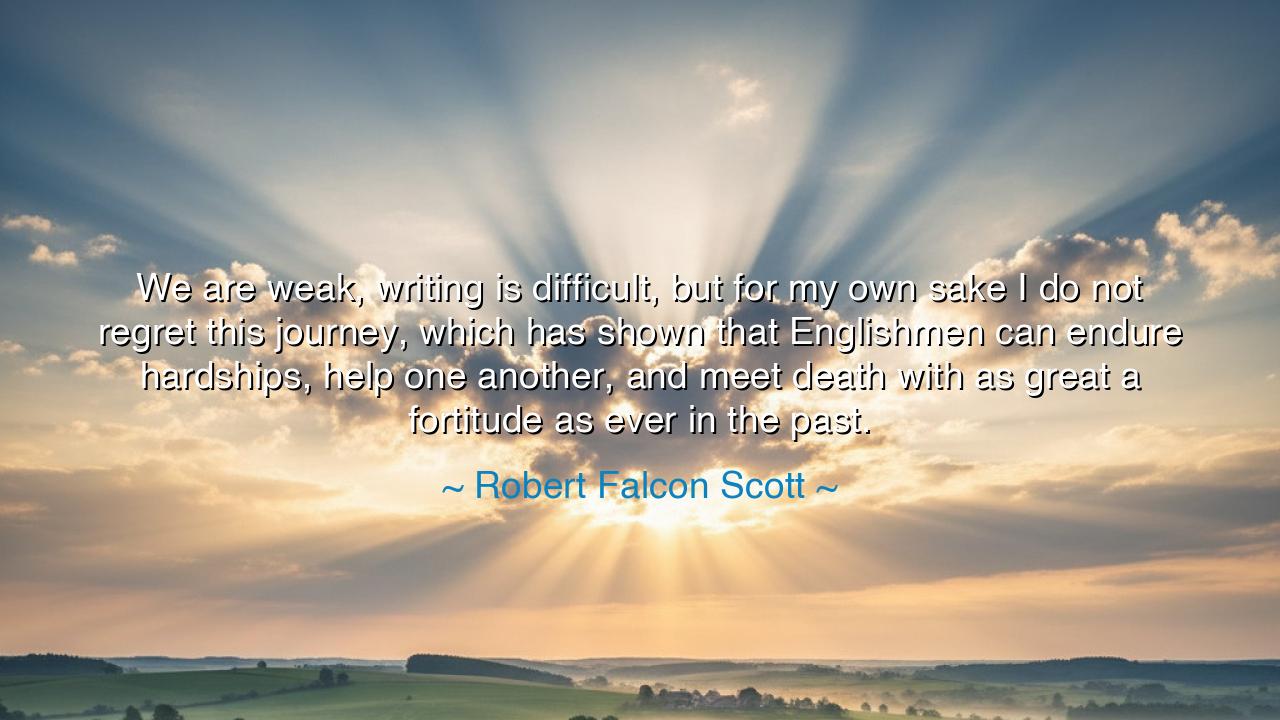
We are weak, writing is difficult, but for my own sake I do not
We are weak, writing is difficult, but for my own sake I do not regret this journey, which has shown that Englishmen can endure hardships, help one another, and meet death with as great a fortitude as ever in the past.






“We are weak, writing is difficult, but for my own sake I do not regret this journey, which has shown that Englishmen can endure hardships, help one another, and meet death with as great a fortitude as ever in the past.” — Robert Falcon Scott
These words were written upon the edge of eternity, carved not in stone but in the frost of the Antarctic wind. They belong to Captain Robert Falcon Scott, the leader of the doomed Terra Nova Expedition of 1910–1913. As his life ebbed away amid the endless snows of the South Pole, he wrote these final lines — not as complaint, nor in despair, but as a testament of courage, brotherhood, and endurance. They are the dying breath of a man who faced death without bitterness, and whose spirit blazed even as the cold closed in around him.
When Scott wrote, “We are weak, writing is difficult,” it was not only his body that trembled, but the very boundary between life and oblivion. His hands were numb, his ink frozen, yet his heart remained aflame with purpose. He had seen his men perish one by one in the white wilderness, but he did not surrender his humanity. In that moment of utter exhaustion, when all earthly comforts had abandoned him, he found strength not in survival, but in meaning — the understanding that suffering, borne with dignity, is not in vain.
The heart of this quote is not death, but honor. “I do not regret this journey,” he said — a declaration that transforms tragedy into triumph. For in his eyes, to face the impossible and still act with courage is the highest form of victory. His journey was not for riches nor glory, but for the pure pursuit of discovery, for the advancement of knowledge, and for the testing of the human soul. The frost that claimed his body could not claim his spirit. He proved that men may perish, but fortitude endures.
Let us remember the story of Captain Oates, one of Scott’s companions. When illness slowed his steps and he knew he endangered his comrades, he rose one morning and said quietly, “I am just going outside and may be some time.” He walked out into the blizzard, never to return. He gave his life that others might have a chance. Such is the essence of Scott’s words — that even in weakness, men can rise to greatness; that even in despair, the flame of selflessness and bravery can burn bright.
In the ancient world, warriors spoke of noble death, of facing fate unflinching. Scott and his men were such warriors, though their battlefield was not one of swords, but of snow and silence. They met death as their forefathers had met the spear and flame — with fortitude, with unity, with quiet pride. They showed the world that true strength lies not in conquest, but in steadfastness; not in avoiding pain, but in enduring it with grace.
So what lesson do these frozen words bring to us, the living? It is this: when trials come — and they surely will — face them not with complaint but with courage. Help one another, as Scott’s men did. Hold fast to your purpose even when the cold winds of life threaten to extinguish your will. For in every age, the measure of greatness is the same — not victory without suffering, but dignity amid defeat.
Let us then, like Scott, say: “I do not regret this journey.” Whatever our path — whether across the frozen plains of the earth or the unseen challenges of the heart — let us walk it fully, with compassion, endurance, and honor. For to live with courage, to stand by others in hardship, and to face the unknown without fear, is to join that eternal lineage of souls who, though they fall, rise forever in the memory of humankind.






AAdministratorAdministrator
Welcome, honored guests. Please leave a comment, we will respond soon